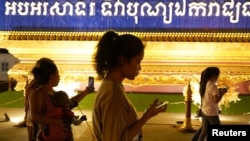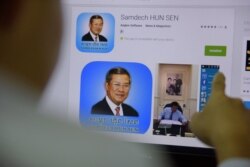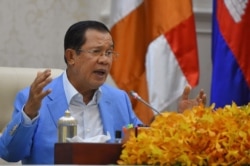Cambodia’s plan to create a gateway to control all online traffic in the country will give authorities expansive powers to curtail rights to free expression, rights groups say.
The Cambodian government issued a subdecree Tuesday to establish a National Internet Gateway (NIG) that would give it control over the flow of information on the internet and the ability to block content and websites.
The government says the directive will boost Cambodian information technology infrastructure and control content that could harm “national security and social order.”
Rights groups, however, said vaguely worded clauses in the subdecree would restrict rights including access to information, privacy and free speech. The plan could also hamper Cambodia’s fledgling IT sector by reducing competitiveness and affecting investments if the government routinely interfered in internet service provider operations, rights groups and local internet service providers said.
The subdecree “empowers the authorities to easily take action to restrict access to information online, or to block websites or social media networks that authorities label as dissenting or critical, even if those websites and social media networks provide independent news or information to the public,” a statement issued by the Cambodian Center for Human Rights and more than 60 other groups said.
Cambodia has a poor record on media freedom, ranking 144 out of 180 countries, where 1 is the most free, on the Reporters Without Borders annual index. Authorities have all but stamped out independent media, often using laws against harming security or national stability to detain journalists and critics, or bringing charges based on comments and information shared online.
The Telecommunication Ministry described the concerns by civil society groups as “unfounded, politically motivated, untrue and contradictory to the objectives.”
The ministry said it had consulted with experts, privately owned operators and relevant institutions on numerous occasions before issuing the subdecree.
“The purpose of National Internet Gateway is to increase the effectiveness of national revenue collection on the basis of fair and honest competition, and transparency between the state and operators, as well as to prevent illegal cross-border network connections, illegal online gambling, cyber threats, pornography, online fraud,” read the statement.
The subdecree is similar to a draft obtained in September by VOA Khmer. Under it, the government would license operators to manage the gateway. The subdecree did not provide details on who would be eligible to act as an operator.
The gateway operator’s duties would include protecting national security, ensuring social order, and protecting “culture and national tradition” — terms often used in other vaguely defined legislation. Loosely defined laws such as these are open to abuse, rights groups have found.
The operator would also have power to act, including ordering internet companies to block or disconnect connections deemed to affect “safety, national revenue, social order, dignity, culture, traditions and customs.”
An appeals system is included for individuals who want to dispute an order, and gateway operators deemed to have shirked their responsibilities will face penalties.
Chak Sopheap, executive director of Cambodian Center for Human Rights, said the directive would give the government power to block access to social media platforms, where Cambodians routinely post opinions and access news articles.
“Several governments have cared about [social media] and think it impedes their power rather than understanding that the people’s participation is an impetus for good governance and social accountability,” Sopheap told VOA Khmer.
Cambodia was home to more than 8.8 million Facebook accounts in 2019, according to data by Freedom House.
Prime Minister Hun Sen has previously moved to restrict or control the internet. Ahead of the 2018 general election, Hun Sen said his government would install infrastructure to track the location of people who criticized his administration on Facebook.
In May 2018, the Telecommunication, Information and Interior ministries formed a working group to monitor the accuracy of news on online media platforms and social media.
Ministries and provincial officials have also been asked to monitor the content posted by citizens, including in private messaging groups. Private phone conversations and messages were used as evidence in trials of former Cambodia National Rescue Party officials and supporters. Cambodia dissolved the opposition party in 2017 after local elections.
Human Rights Watch called the gateway “the missing tool in the government’s toolbox for online repression.”
It added that the subdecree failed to provide for independent oversight, noting that appeals would be heard via the court system, which Human Rights Watch said lacks independence.
“Foreign governments, tech companies, e-commerce businesses and other private actors should urgently call on the government to reverse the adoption of this harmful subdecree,” said Phil Robertson, deputy Asia director at Human Rights Watch, in a statement Thursday.
Rights groups have also warned that the internet gateway could cause a significant reduction in internet speeds, a factor that discouraged other governments from creating a similar firewall.
Civil society and businesses objected to a similar initiative in Thailand, which was scrapped in 2015 before implementation.
“If private companies are compelled to leave, it will be consumers who ultimately pay the price,” the civil society groups said.
Sok Channda, the CEO of internet service provider MekongNet, said her team and representatives from other internet service providers (ISPs) had met with the Ministry of Telecommunication last year about the subdecree.
She said the ISPs raised concerns about the plans, including the logistics of connecting their systems to the internet gateway and the potential for internet outages because there was one single gateway.
“We raised our concerns, but the ministry has not solved concerns raised by me and other ISPs,” she said. “I am concerned that if the state-run link fails, it will disconnect all ISPs.”
Channda didn’t comment on concerns raised by rights groups about censorship and data privacy, adding that MekongNet follows Cambodian laws.


